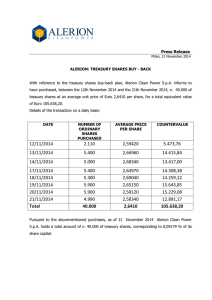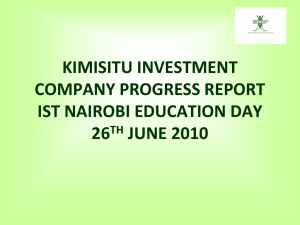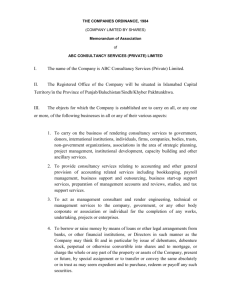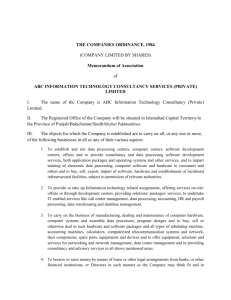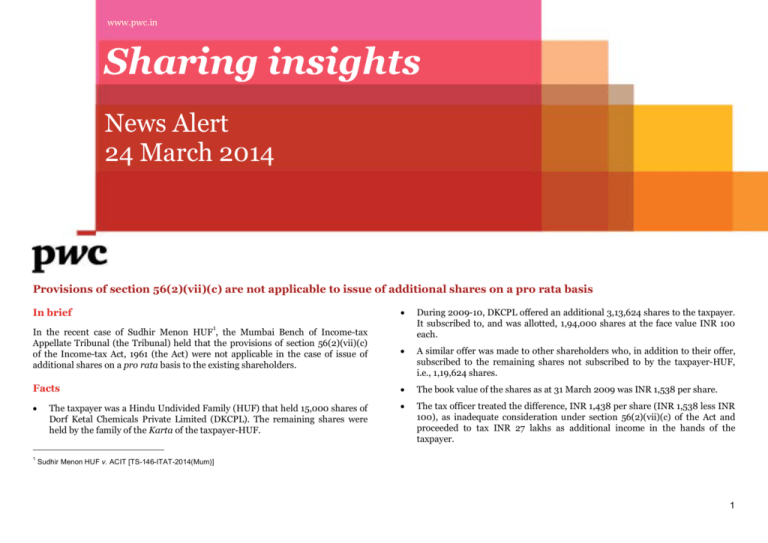
www.pwc.in
Sharing insights
News Alert
24 March 2014
Provisions of section 56(2)(vii)(c) are not applicable to issue of additional shares on a pro rata basis
In brief
•
In the recent case of Sudhir Menon HUF , the Mumbai Bench of Income-tax
Appellate Tribunal (the Tribunal) held that the provisions of section 56(2)(vii)(c)
of the Income-tax Act, 1961 (the Act) were not applicable in the case of issue of
additional shares on a pro rata basis to the existing shareholders.
During 2009-10, DKCPL offered an additional 3,13,624 shares to the taxpayer.
It subscribed to, and was allotted, 1,94,000 shares at the face value INR 100
each.
•
A similar offer was made to other shareholders who, in addition to their offer,
subscribed to the remaining shares not subscribed to by the taxpayer-HUF,
i.e., 1,19,624 shares.
Facts
•
The book value of the shares as at 31 March 2009 was INR 1,538 per share.
•
•
The tax officer treated the difference, INR 1,438 per share (INR 1,538 less INR
100), as inadequate consideration under section 56(2)(vii)(c) of the Act and
proceeded to tax INR 27 lakhs as additional income in the hands of the
taxpayer.
1
1
The taxpayer was a Hindu Undivided Family (HUF) that held 15,000 shares of
Dorf Ketal Chemicals Private Limited (DKCPL). The remaining shares were
held by the family of the Karta of the taxpayer-HUF.
Sudhir Menon HUF v. ACIT [TS-146-ITAT-2014(Mum)]
1
PwC News Alert
March 2014
Issue before the Tribunal
Whether it was valid in law to assess the difference between the value of the shares
allotted to the taxpayer and the consideration paid by it, as the taxpayer’s income?
issuing the shares was not the owner of the shares, the transaction could not be
considered as a “receipt from any person or persons”.
•
Revenue’s contentions
•
The taxpayer was in receipt of additional shares at the face value of INR 100
per share. These additional shares fell within the meaning of ‘shares and
securities’ in the Explanation to section 56(2)(vii) of the Act.
•
The book value of the shares of DKCPL as on 31 March 2009 was INR 1,538
per share. This value had to be adopted as the Fair Market Value (FMV) under
the applicable Rule 11U and 11UA of Income-tax Rules, 1962.
•
Hence, the excess of the FMV over the consideration paid, i.e., INR 1,458 per
share or in aggregate INR 27 lakhs, had to be considered as the extent of the
inadequate consideration towards the acquisition of additional shares and
hence, exigible to tax in the taxpayer's hands.
Tribunal’s ruling
•
Property as contemplated under section 56(2)(vii)(c) of the Act included
‘shares and securities’ and it was held that the property under reference, i.e.,
rights shares, qualified as 'property' under section 56(2)(vii)(c) of the Act,
ruling out the taxpayer’s contention that the right to acquire additional shares
was not property in this case.
•
The Tribunal observed that though the taxpayer obtained the right to acquire
additional shares at the time of passing the Board resolution, the receipt of the
property happened only at the time of allotment of shares. This was also the
2
date when the property came into existence .
•
The Tribunal further observed that the transaction was ostensibly covered by
the clear and unambiguous language of the provision. However, it also
observed that it needed to be understood whether the provision led to
unintended or absurd results. It noted that through the medium of additional
shares, issued at below market rates, substantial controlling interest in a
company or business or property could be passed on. Hence, the provision of
bringing to tax the shortfall in consideration over the FMV is on a firm, cogent
and sound footing.
•
Issue of bonus shares would not be covered under this section, as there was
neither any increase nor decrease in the wealth of the shareholders/ issuing
company nor any change in the percentage shareholding. It was merely a
process of capitalisation of the company’s profits. There was no receipt of any
Taxpayer’s contentions
•
The taxpayer contended that the ‘right to acquire additional shares (at a
concessional rate) in the company’ was not a property within the meaning of
the Explanation to section 56(2)(vii) of the Act. While the right to acquire
additional shares came into existence at the time the Board resolution was
passed, the shares came into existence only at the time of allotment of shares.
The event of receipt of property, so far the taxpayer was concerned, was the
point of time when it obtained the right to acquire additional shares, and not
the allotment of shares. Hence, the provisions of section 56(2)(vii)(c) of the Act
were never intended to cover a transaction in the nature of a rights issue.
•
If section 56(2)(vii)(c) of the Act was made applicable to a rights issue, then a
similar treatment may be required to be attributed to bonus shares also, which
may lead to absurd results.
•
In the present case, there was neither a transfer in favour of the taxpayer, nor
was the issuer- company the owner of the shares. The section which required
“receipt from any person or persons” will not per se apply in the case of the
taxpayer, as the company issuing the shares was not the owner of the shares.
As allotment of shares was not a transfer of capital asset and the company
Furthermore, the taxpayer contended that the right to acquire additional
shares arose out of the existing shareholding, and that the transaction under
consideration could be compared to a demerger where the shareholders of the
demerged company acquired shares in the resulting company based on their
shareholding in the demerged company.
2
Relied on Supreme Court decisions in the case of Shree Gopal and Company v. Calcutta Stock
Exchange Limited [1963] 32 Comp. Cas. 862 (SC) and Khoday Distilleries Ltd. v. CIT [2008] 307 ITR
312 (SC)
2
PwC News Alert
March 2014
property by the shareholder and what stood received by the shareholder was
3
the split shares out of its own holdings .
•
•
•
•
However, the Tribunal rejected the taxpayer’s argument of comparing the
additional shares to shares received by shareholders of a demerged company in
the resulting company. It stated that the shareholders were receiving only the
value of their existing shares in the demerged company in the form of shares in
the resulting company. Furthermore, section 56(2) of the Act specifically
excluded shares allotted in a demerger from its ambit.
The taxpayer’s argument that section 56(2)(vii)(c) of the Act was not
applicable, as there was neither a transfer in its favour nor was the issuer
company the owner of the shares, was rejected by the Tribunal stating that the
section nowhere stipulated ‘transfer’ as a prescribed mode of acquisition. The
burden of the Revenue to prove that property was received by the taxpayer was
discharged when the Revenue was able to prove that the taxpayer itself was the
owner of the property. The Tribunal further observed that where allotment of
shares was taken as the event of receipt of property, the taxpayer's argument
would fail.
In the present case, as a result of the transaction, the shareholding of the
taxpayer stood reduced from 4.98% to 3.17%. The premise on which it was
found that section 56(2)(vii)(c) of the Act was not applicable to bonus shares
could be applied in the case of issue of additional shares as well, to the extent it
was proportional to the existing shareholding. To the extent the shares
subscribed were rights shares, i.e., allotted pro rata on the basis of the existing
shareholding, the provisions though per se applicable, do not operate
adversely. A disproportionate allotment under a rights issue may trigger the
provisions of section 56(2)(vii)(c) of the Act. Furthermore, no additional
property could be said to have been received by the taxpayer to the extent the
value of property was derived from existing shareholding, on the basis of which
the additional shares are allotted.
a larger number of shares. Hence, no addition under section 56(2)(vii)(c) of
4
the Act would arise in the present case .
•
The provision was brought in as an anti-abuse measure to tax the
understatement of consideration as income in the hands of the recipient.
However, it should not be read to alter the meaning of a statutory provision
where such meaning was plain and unambiguous.
•
Based on the above, the addition of income of INR 27 lakhs was quashed as the
amount could not be assessed as income on the grounds of inadequate
consideration.
PwC observations
•
The conclusion of the Tribunal that “receipt” of shares, irrespective of whether
the receipt of shares is by way of transfer or otherwise, is adequate for
invoking section 56(2)(vii)(c) of the Act may have wide ramifications for other
forms of receipts of shares such as subscription for new shares, etc.
•
However, the Tribunal has qualified this analogy for pro rata allotment of
shares to the existing shareholders and receipt of fresh shares by way of bonus
issue, as there is no additional gain derived by the shareholders in such
scenarios.
•
While a literal interpretation of the provisions may be adopted, as this is an
anti-abuse provision, the facts should be analysed having regard to the
intention of the section before concluding about its applicability.
The Tribunal held that as long as there was no disproportionate allotment of
shares, there was no scope for any property being received by the taxpayer, as
there was only an apportionment of the value of the existing shareholding over
4
3
Relied on Supreme Court decision in the case of CIT v. Dalmia Investment Co. Ltd [1964] 52 ITR 567
Dhun Dadabhoy Kapadia v. CIT [1967] 63 ITR 651 (SC) and H. Holck Larsen v. CIT [1972] 85 ITR
285 (Bom)
(SC) and Khoday Distilleries Ltd. v. CIT [2008] 307 ITR 312 (SC)
3
PwC News Alert
March 2014
About PwC
PwC helps organisations and individuals create the value they’re looking for. We’re a network of firms in 157 countries with more than 184,000 people who are committed to
delivering quality in Assurance, Tax and Advisory services.
PwC India refers to the network of PwC firms in India, having offices in: Ahmedabad, Bangalore, Chennai, Delhi NCR, Hyderabad, Kolkata, Mumbai and Pune. For more
information about PwC India's service offerings, please visit www.pwc.in.
*PwC refers to PwC India and may sometimes refer to the PwC network. Each member firm is a separate legal entity. Please see www.pwc.com/structure for further details.
Tell us what matters to you and find out more by visiting us at www.pwc.in.
Our offices
Ahmedabad
Bangalore
Chennai
Hyderabad
Kolkata
President Plaza, 1st Floor Plot No 36
6th Floor, Millenia Tower 'D'
8th Floor, Prestige Palladium Bayan
#8-2-293/82/A/113A Road no. 36,
56 & 57, Block DN.
Opp Muktidham Derasar
1 & 2, Murphy Road, Ulsoor,
129-140 Greams Road,
Jubilee Hills, Hyderabad 500 034,
Ground Floor, A- Wing
Thaltej Cross Road, SG Highway
Bangalore 560 008
Chennai 600 006, India
Andhra Pradesh
Sector - V, Salt Lake.
Ahmedabad, Gujarat 380054
Phone +91-80 4079 7000
Phone +91 44 4228 5000
Phone +91-40 6624 6600
Kolkata - 700 091, West Bengal, India
Telephone: +91-033 - 2357 9101/4400 1111
Phone +91-79 3091 7000
Fax: (91) 033 - 2357 2754
Mumbai
Gurgaon
Pune
For more information contact us at,
PwC House, Plot No. 18A,
Building No. 10, Tower - C
GF-02, Tower C,
pwctrs.knowledgemanagement@in.pwc.com
Guru Nanak Road - (Station Road),
17th & 18th Floor,
Panchshil Tech Park,
Bandra (West), Mumbai - 400 050
DLF Cyber City, Gurgaon
Don Bosco School Road,
Phone +91-22 6689 1000
Haryana -122002
Yerwada, Pune - 411 006
Phone : +91-124 330 6000
Phone +91-20 4100 4444
For private circulation only
This publication has been prepared for general guidance on matters of interest only, and does not constitute professional advice. You should not act upon the information contained in this publication without obtaining specific professional advice. No
representation or warranty (express or implied) is given as to the accuracy or completeness of the information contained in this publication, and, to the extent permitted by law, PwCPL, its members, employees and agents accept no liability, and disclaim
all responsibility, for the consequences of you or anyone else acting, or refraining to act, in reliance on the information contained in this publication or for any decision based on it. Without prior permission of PwCPL, this publication may not be quoted in
whole or in part or otherwise referred to in any documents.
©2014 PricewaterhouseCoopers. All rights reserved. "PwC", a registered trademark, refers to PricewaterhouseCoopers Private Limited (a limited company in India) or, as the context requires, other member firms of PricewaterhouseCoopers International
Limited, each of which is a separate and independent legal entity.
4




